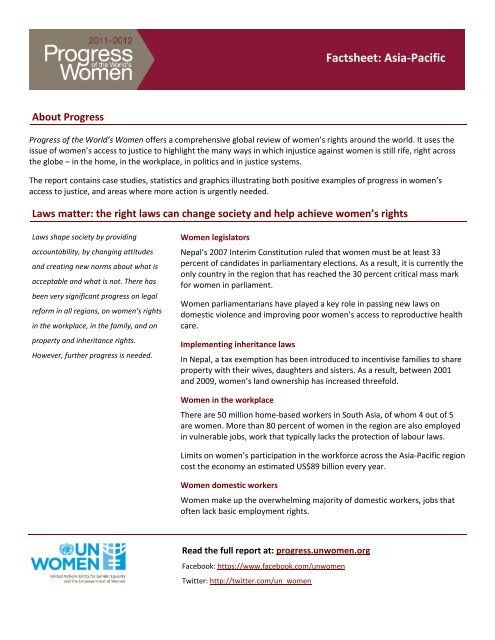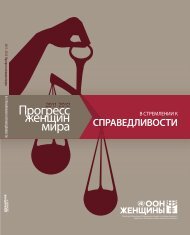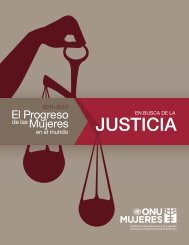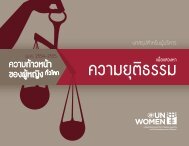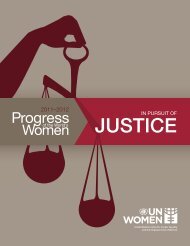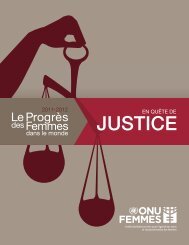Factsheet: Asia-Pacific - Progress of the World's Women
Factsheet: Asia-Pacific - Progress of the World's Women
Factsheet: Asia-Pacific - Progress of the World's Women
You also want an ePaper? Increase the reach of your titles
YUMPU automatically turns print PDFs into web optimized ePapers that Google loves.
<strong>Factsheet</strong>: <strong>Asia</strong>-<strong>Pacific</strong><br />
About <strong>Progress</strong><br />
<strong>Progress</strong> <strong>of</strong> <strong>the</strong> World’s <strong>Women</strong> <strong>of</strong>fers a comprehensive global review <strong>of</strong> women’s rights around <strong>the</strong> world. It uses <strong>the</strong><br />
issue <strong>of</strong> women’s access to justice to highlight <strong>the</strong> many ways in which injustice against women is still rife, right across<br />
<strong>the</strong> globe – in <strong>the</strong> home, in <strong>the</strong> workplace, in politics and in justice systems.<br />
The report contains case studies, statistics and graphics illustrating both positive examples <strong>of</strong> progress in women’s<br />
access to justice, and areas where more action is urgently needed.<br />
Laws matter: <strong>the</strong> right laws can change society and help achieve women’s rights<br />
Laws shape society by providing<br />
accountability, by changing attitudes<br />
and creating new norms about what is<br />
acceptable and what is not. There has<br />
been very significant progress on legal<br />
reform in all regions, on women’s rights<br />
in <strong>the</strong> workplace, in <strong>the</strong> family, and on<br />
property and inheritance rights.<br />
However, fur<strong>the</strong>r progress is needed.<br />
<strong>Women</strong> legislators<br />
Nepal’s 2007 Interim Constitution ruled that women must be at least 33<br />
percent <strong>of</strong> candidates in parliamentary elections. As a result, it is currently <strong>the</strong><br />
only country in <strong>the</strong> region that has reached <strong>the</strong> 30 percent critical mass mark<br />
for women in parliament.<br />
<strong>Women</strong> parliamentarians have played a key role in passing new laws on<br />
domestic violence and improving poor women’s access to reproductive health<br />
care.<br />
Implementing inheritance laws<br />
In Nepal, a tax exemption has been introduced to incentivise families to share<br />
property with <strong>the</strong>ir wives, daughters and sisters. As a result, between 2001<br />
and 2009, women’s land ownership has increased threefold.<br />
<strong>Women</strong> in <strong>the</strong> workplace<br />
There are 50 million home-based workers in South <strong>Asia</strong>, <strong>of</strong> whom 4 out <strong>of</strong> 5<br />
are women. More than 80 percent <strong>of</strong> women in <strong>the</strong> region are also employed<br />
in vulnerable jobs, work that typically lacks <strong>the</strong> protection <strong>of</strong> labour laws.<br />
Limits on women’s participation in <strong>the</strong> workforce across <strong>the</strong> <strong>Asia</strong>-<strong>Pacific</strong> region<br />
cost <strong>the</strong> economy an estimated US$89 billion every year.<br />
<strong>Women</strong> domestic workers<br />
<strong>Women</strong> make up <strong>the</strong> overwhelming majority <strong>of</strong> domestic workers, jobs that<br />
<strong>of</strong>ten lack basic employment rights.<br />
Read <strong>the</strong> full report at: progress.unwomen.org<br />
Facebook: https://www.facebook.com/unwomen<br />
Twitter: http://twitter.com/un_women
<strong>Factsheet</strong>: <strong>Asia</strong>-<strong>Pacific</strong><br />
<strong>Women</strong> account for nearly two thirds <strong>of</strong> Sri Lanka’s one million international<br />
migrants, many <strong>of</strong> whom are employed in <strong>the</strong> Gulf States as domestic workers.<br />
Toge<strong>the</strong>r, <strong>the</strong>se women contribute $1.7 billion annually in remittances to <strong>the</strong><br />
economy <strong>of</strong> Sri Lanka.<br />
A review <strong>of</strong> 14 countries in <strong>the</strong> <strong>Asia</strong>-<strong>Pacific</strong> region found that domestic<br />
workers are entitled to health care in only three countries and are entitled to<br />
unemployment insurance in none <strong>of</strong> <strong>the</strong> countries reviewed.<br />
The private sphere must not be ‘outside justice’<br />
<strong>Women</strong>’s rights are typically least<br />
protected in <strong>the</strong> private and domestic<br />
sphere – traditionally seen as ‘outside <strong>of</strong><br />
justice’ – where women <strong>of</strong>ten have little<br />
say on decisions about <strong>the</strong>ir sexuality, on<br />
marriage and reproductive health. The<br />
domestic sphere is also where <strong>the</strong><br />
majority <strong>of</strong> violence against women<br />
occurs, holding back women’s<br />
empowerment in all regions.<br />
High levels <strong>of</strong> domestic violence<br />
Based on prevalence surveys in some countries in <strong>the</strong> region, nearly half <strong>of</strong><br />
women have experienced physical and sexual violence at <strong>the</strong> hands <strong>of</strong> an<br />
intimate partner.<br />
Acceptance <strong>of</strong> violence against women<br />
According to surveys in seven countries in <strong>the</strong> region, on average a third <strong>of</strong><br />
respondents say that it is sometimes acceptable for a man to beat his wife,<br />
including over half <strong>of</strong> respondents in Malaysia and nearly two thirds in<br />
Thailand.<br />
New laws to combat violence<br />
There are 19 countries and territories in <strong>the</strong> <strong>Asia</strong>-<strong>Pacific</strong> region that have<br />
passed laws to prohibit domestic violence.<br />
However, only eight countries and territories throughout <strong>the</strong> <strong>Asia</strong>-<strong>Pacific</strong><br />
region explicitly criminalize marital rape, leaving millions <strong>of</strong> women exposed to<br />
abuse at <strong>the</strong> hands <strong>of</strong> <strong>the</strong>ir partners.<br />
Global data show that where laws are in place against domestic violence,<br />
prevalence <strong>of</strong> domestic violence is lower and fewer people think it is<br />
acceptable. A survey in Cambodia, where a new law was passed in 2005, found<br />
that whereas in<br />
Read <strong>the</strong> full report at: progress.unwomen.org<br />
Facebook: https://www.facebook.com/unwomen<br />
Twitter: http://twitter.com/un_women
<strong>Factsheet</strong>: <strong>Asia</strong>-<strong>Pacific</strong><br />
2005 64 percent <strong>of</strong> respondents knew a man who physically abused his wife,<br />
by 2009 this figure had dropped to 53 percent.<br />
Implementation <strong>of</strong> laws and <strong>the</strong> infrastructure <strong>of</strong> justice<br />
Laws mean nothing if <strong>the</strong>y are not<br />
implemented. Weak justice<br />
infrastructure presents major practical<br />
barriers to achieving justice for women<br />
in <strong>the</strong> <strong>Asia</strong>-<strong>Pacific</strong> region. These practical<br />
barriers are <strong>of</strong>ten worse for women,<br />
who may lack knowledge <strong>of</strong> <strong>the</strong>ir rights,<br />
face social stigma, or struggle to meet<br />
court costs. However, many<br />
governments have taken positive steps<br />
to improve access for women, <strong>Progress</strong><br />
shows.<br />
Social barriers<br />
Surveys found that in five countries in <strong>the</strong> <strong>Asia</strong>-<strong>Pacific</strong> region, a third or more<br />
women had no say in vital everyday decisions in <strong>the</strong>ir own home, such as <strong>the</strong>ir<br />
own health care, household purchases, or visits to family.<br />
A study in Timor-Leste found that 58 percent <strong>of</strong> people disapproved <strong>of</strong> women<br />
speaking on <strong>the</strong>ir own behalf in local disputes.<br />
Discrimination in <strong>the</strong> legal system<br />
A study in two South <strong>Asia</strong>n countries found that between 74 and 94 percent <strong>of</strong><br />
police said that a husband is allowed to rape his wife.<br />
Research by <strong>the</strong> United Nations Assistance Mission in Afghanistan found that<br />
in almost every case investigated, rape victims had <strong>the</strong>mselves been charged<br />
with adultery.<br />
Money<br />
Unaffordable costs can lock women out <strong>of</strong> <strong>the</strong> justice system. Fees for forensic<br />
examinations, <strong>of</strong>ten essential for pro<strong>of</strong> in rape cases, cost between US$5 and<br />
$14 in Cambodia, about two weeks’ average income in rural areas.<br />
Distant courts<br />
In Indonesia, a survey found that only 38 percent <strong>of</strong> people felt courts were<br />
within an accessible distance from <strong>the</strong>ir homes.<br />
<strong>Women</strong>’s under-representation in <strong>the</strong> justice system<br />
A quarter <strong>of</strong> judges and around a fifth <strong>of</strong> prosecution staff in East <strong>Asia</strong> and <strong>the</strong><br />
<strong>Pacific</strong> are women. But South <strong>Asia</strong> lags behind, with women making up just 9<br />
percent <strong>of</strong> judges and 4 percent <strong>of</strong> prosecution staff.<br />
Globally, data from 57 countries show that where women are present in <strong>the</strong><br />
police, reporting <strong>of</strong> sexual assault increases. But on average women are just 3<br />
Read <strong>the</strong> full report at: progress.unwomen.org<br />
Facebook: https://www.facebook.com/unwomen<br />
Twitter: http://twitter.com/un_women
<strong>Factsheet</strong>: <strong>Asia</strong>-<strong>Pacific</strong><br />
Percent <strong>of</strong> police in South <strong>Asia</strong>, and 9 percent <strong>of</strong> police in East <strong>Asia</strong> and <strong>the</strong><br />
<strong>Pacific</strong>.<br />
Making <strong>the</strong> justice system work for women<br />
In India, <strong>the</strong> 2005 Protection <strong>of</strong> <strong>Women</strong> from Domestic Violence Act has led to<br />
<strong>the</strong> creation <strong>of</strong> a new corps <strong>of</strong> protection <strong>of</strong>ficers, who can file domestic<br />
incident reports and help victims to access courts and support services.<br />
<strong>Women</strong>’s representation in religious legal systems<br />
Some justice systems based on religious or ethnic identity do not permit<br />
women as adjudicators or judges. Malaysia has had women judges in its civil<br />
courts for many years, but in 2010 women were finally permitted to sit as<br />
judges in <strong>the</strong> Syariah courts (state courts which deal with aspects <strong>of</strong> Islamic<br />
law).<br />
Raising awareness <strong>of</strong> women’s rights<br />
The Bangladesh Rural Advancement Committee (BRAC) runs <strong>the</strong> largest NGOled<br />
human rights and legal education programme in <strong>the</strong> world, and has<br />
reached 3.5 million women.<br />
Legal aid for women<br />
The Fiji <strong>Women</strong>’s Crisis Centre provides free and confidential crisis counselling<br />
and legal advice, as well as referrals to courts, police stations, health care and<br />
o<strong>the</strong>r services. It also provides training for men leaders to challenge cultural<br />
and religious justifications <strong>of</strong> violence against women.<br />
In Pakistan, <strong>the</strong> NGO Shirkat Gah has trained paralegals to help women to<br />
navigate justice systems and to influence law reform.<br />
Increasing access to religious courts<br />
In Indonesia, <strong>the</strong> Government is investing in religious courts, which handle 98<br />
percent <strong>of</strong> divorces in <strong>the</strong> country. By increasing <strong>the</strong> number <strong>of</strong> circuit courts<br />
that can reach remote rural areas and waiving court fees, more women can<br />
legally register <strong>the</strong>ir marriage or divorce, which is essential for accessing public<br />
services.<br />
Read <strong>the</strong> full report at: progress.unwomen.org<br />
Facebook: https://www.facebook.com/unwomen<br />
Twitter: http://twitter.com/un_women
<strong>Factsheet</strong>: <strong>Asia</strong>-<strong>Pacific</strong><br />
Reforming non-state justice systems<br />
Landmark cases: how <strong>Asia</strong>-<strong>Pacific</strong> women are changing laws<br />
In Bangladesh, <strong>the</strong> Shalish is a community-based justice system, in which<br />
panels <strong>of</strong> influential local figures help to resolve family matters. NGOs such as<br />
<strong>the</strong> Maduripur Legal Aid Association and Nagorik Uddyog are working with <strong>the</strong><br />
Shalish to provide training on gender equality and record keeping to improve<br />
accountability and outcomes for women.<br />
<strong>Progress</strong> highlights key legal cases in<br />
<strong>the</strong> <strong>Asia</strong>-<strong>Pacific</strong> region which have<br />
changed legislation and attitudes.<br />
Outlawing marital rape: Forum for <strong>Women</strong>, Law and Development (FWLD),<br />
Nepal<br />
Case<br />
Until 2002, when <strong>the</strong> NGO FWLD brought a case to <strong>the</strong> Supreme Court,<br />
married women in Nepal raped by <strong>the</strong>ir husbands had no recourse to justice.<br />
Outcome<br />
This case invalidated <strong>the</strong> provision <strong>of</strong> <strong>the</strong> Nepalese criminal code that<br />
exempted husbands from being charged with <strong>the</strong> rape <strong>of</strong> <strong>the</strong>ir wives. In<br />
rejecting <strong>the</strong> Government’s argument that outlawing marital rape would<br />
<strong>of</strong>fend Hindu beliefs, <strong>the</strong> ruling also ended <strong>the</strong> conflict between <strong>the</strong> country’s<br />
Muluki Ain civil code, based on Hindu religious principles, and <strong>the</strong> 1990<br />
Constitution, which pledges to end all forms <strong>of</strong> gender discrimination.<br />
Cases such as this reflect sweeping changes to <strong>the</strong> assumption that a wife<br />
implicitly consents to all sexual activity. To date, at least 52 States have<br />
explicitly outlawed marital rape in <strong>the</strong>ir criminal codes.<br />
The government must protect women against sexual harassment in <strong>the</strong><br />
workplace: Bhanwari Devi, India<br />
Case<br />
After being gang-raped while doing her job as a social worker, Devi not only<br />
initiated criminal proceedings, but also sought a broader remedy for o<strong>the</strong>r<br />
working women. <strong>Women</strong>’s organisations supported her case in <strong>the</strong> Supreme<br />
Court against <strong>the</strong> State <strong>of</strong> Rajasthan.<br />
Read <strong>the</strong> full report at: progress.unwomen.org<br />
Facebook: https://www.facebook.com/unwomen<br />
Twitter: http://twitter.com/un_women
<strong>Factsheet</strong>: <strong>Asia</strong>-<strong>Pacific</strong><br />
Outcome<br />
In 1997 Devi won watershed recognition <strong>of</strong> <strong>the</strong> Government’s obligation to<br />
provide legal protection from sexual harassment in <strong>the</strong> workplace, after <strong>the</strong><br />
Court recognized <strong>the</strong> right to gender equality and to a safe working<br />
environment, free from sexual harassment or abuse, based on <strong>the</strong><br />
Constitution and India’s international obligations under CEDAW.<br />
The Court used <strong>the</strong> case to produce <strong>the</strong> first comprehensive civil law<br />
guidelines on <strong>the</strong> rights <strong>of</strong> working women against violence and harassment in<br />
both public and private employment. This prompted <strong>the</strong> Government to<br />
introduce a long-awaited bill prohibiting sexual harassment in <strong>the</strong> workplace<br />
in 2007. The case has also influenced a similar case in Bangladesh and<br />
legislation in Pakistan, so that today, almost 500 million women <strong>of</strong> working<br />
age in <strong>the</strong>se three countries alone have <strong>the</strong> legal protection <strong>the</strong>y need to carry<br />
out <strong>the</strong>ir work free from harassment and abuse.<br />
Highlighting discrimination within <strong>the</strong> legal system: Rape survivor in <strong>the</strong><br />
Philippines<br />
Case<br />
A rape survivor in <strong>the</strong> Philippines alleged that myths and misconceptions<br />
about rape had influenced <strong>the</strong> judge in her case, leading to <strong>the</strong> acquittal <strong>of</strong> <strong>the</strong><br />
alleged rapist. The complainant identified seven ‘rape myths’, including <strong>the</strong><br />
idea that, because she knew her attacker, consent was implied.<br />
Outcome<br />
The CEDAW Committee found that <strong>the</strong> woman had been re-victimized through<br />
her treatment by <strong>the</strong> court, and recommended that <strong>the</strong> Government award<br />
compensation and put in place appropriate training for justice pr<strong>of</strong>essionals.<br />
Read <strong>the</strong> full report at: progress.unwomen.org<br />
Facebook: https://www.facebook.com/unwomen<br />
Twitter: http://twitter.com/un_women


